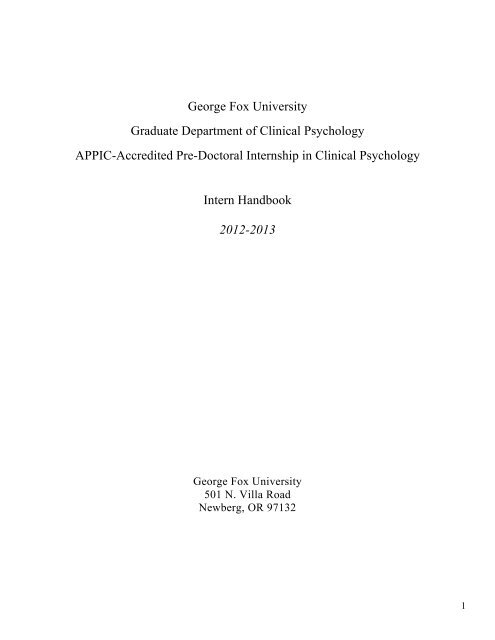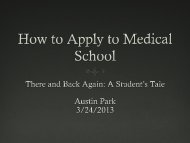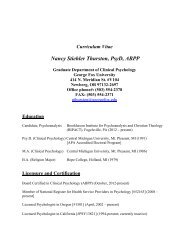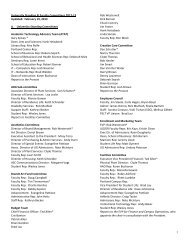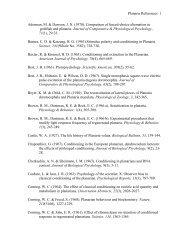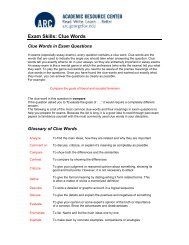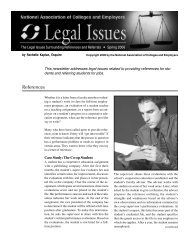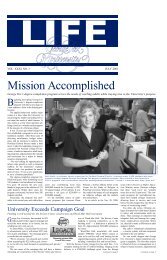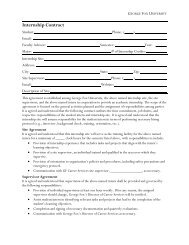The GDCP Training Manual can be downloaded here - George Fox ...
The GDCP Training Manual can be downloaded here - George Fox ...
The GDCP Training Manual can be downloaded here - George Fox ...
You also want an ePaper? Increase the reach of your titles
YUMPU automatically turns print PDFs into web optimized ePapers that Google loves.
<strong>George</strong> <strong>Fox</strong> University<br />
Graduate Department of Clinical Psychology<br />
APPIC-Accredited Pre-Doctoral Internship in Clinical Psychology<br />
Intern Handbook<br />
2012-2013<br />
<strong>George</strong> <strong>Fox</strong> University<br />
501 N. Villa Road<br />
New<strong>be</strong>rg, OR 97132<br />
1
Table of Contents<br />
TABLE OF CONTENTS...................................................................................................................................................................... 2 <br />
PROGRAM OVERVIEW .................................................................................................................................................................... 3 <br />
GEORGE FOX BEHAVIORAL HEALTH CLINIC (BHC)...........................................................................................................................................4 <br />
GEORGE FOX UNIVERSITY (GFU) ..........................................................................................................................................................................4 <br />
PROVIDENCE MEDICAL GROUP (PMG) ................................................................................................................................................................4 <br />
FACILITIES ..................................................................................................................................................................................................................5 <br />
TRAINING MODEL AND PROGRAM PHILOSOPHY.................................................................................................................. 5 <br />
GOALS AND COMPETENCIES....................................................................................................................................................................................6 <br />
Goal #1....................................................................................................................................................................................................................... 6 <br />
Goal #2....................................................................................................................................................................................................................... 7 <br />
Goal #3....................................................................................................................................................................................................................... 7 <br />
Goal #4....................................................................................................................................................................................................................... 8 <br />
Goal #5....................................................................................................................................................................................................................... 8 <br />
PROFESSIONAL FOCUS AREAS.................................................................................................................................................................................8 <br />
ESTIMATED WEEKLY SCHEDULE............................................................................................................................................................................9 <br />
POLICIES AND PROCEDURES......................................................................................................................................................10 <br />
APPLICATION FOR INTERNSHIP........................................................................................................................................................................... 10 <br />
REQUIREMENTS FOR SELECTION......................................................................................................................................................................... 10 <br />
START AND END DATES ........................................................................................................................................................................................ 11 <br />
SALARY, BENEFITS, AND ADMINISTRATIVE SUPPORT..................................................................................................................................... 11 <br />
SUPERVISION AND DIDACTICS.............................................................................................................................................................................. 11 <br />
STAFF........................................................................................................................................................................................................................ 11 <br />
ORIENTATION TO INTERNSHIP ............................................................................................................................................................................ 11 <br />
INTERNSHIP COMPLETION CRITERIA ................................................................................................................................................................. 12 <br />
EVALUATIONS ......................................................................................................................................................................................................... 12 <br />
WORKING HOURS................................................................................................................................................................................................... 12 <br />
SELF-‐STUDY ............................................................................................................................................................................................................ 12 <br />
VACATION AND SICK LEAVE................................................................................................................................................................................. 12 <br />
EXTENDED ABSENCE ............................................................................................................................................................................................. 13 <br />
ACADEMIC INTEGRITY........................................................................................................................................................................................... 13 <br />
CLINICAL SUITABILITY CONCERNS...................................................................................................................................................................... 13 <br />
Concerns and Grievance Process...................................................................................................................................................................13 <br />
Appeal Process......................................................................................................................................................................................................14 <br />
Complaints Against Fellow Interns..............................................................................................................................................................15 <br />
SEXUAL HARASSMENT POLICY............................................................................................................................................................................. 16 <br />
COMMUNITY ASPIRATIONS................................................................................................................................................................................... 16 <br />
DIDACTIC AND SUPPLEMENTAL SUPERVISION SCHEDULE .............................................................................................17 <br />
GEORGE FOX UNIVERSITY PRE-DOCTORAL INTERN EVALUATION...............................................................................19 <br />
EVALUATION OF INTERNSHIP ...................................................................................................................................................22 <br />
2
Program Overview<br />
<strong>The</strong> <strong>George</strong> <strong>Fox</strong> University (GFU) Predoctoral Internship in Clinical Psychology operates under the auspices of<br />
the GFU Graduate Department of Clinical Psychology (<strong>GDCP</strong>), which offers a PsyD degree in clinical<br />
psychology accredited by the Ameri<strong>can</strong> Psychological Association’s Commission on Accreditation. <strong>The</strong> <strong>GDCP</strong><br />
mission is:<br />
to provide excellent education and training for future clinical psychologists who will provide<br />
outstanding professional services to their clients and agencies, and demonstrate special expertise<br />
when working with clients desiring a spiritual dimension, especially that characteristic of the<br />
Christian community.<br />
<strong>The</strong> spiritual mission of the <strong>GDCP</strong>—deeply rooted in GFU’s Quaker identity—operates from a position of<br />
respect for all people, commitment to understanding and celebrating human diversity, and ad<strong>here</strong>nce to<br />
prevailing ethical standards articulated by the Ameri<strong>can</strong> Psychological Association (APA).<br />
<strong>The</strong> predoctoral internship program was initiated in 2011 and approved for APPIC accreditation the same year.<br />
It was developed in recognition of the <strong>GDCP</strong>’s strategic role in innovative models of professional practice,<br />
especially those involving integrated services in primary care settings and short-term psychotherapy<br />
interventions. In addition to providing training for a cohort of interns each year, the internship contributes to<br />
workforce development for integrated healthcare. Nationally, t<strong>here</strong> is a shortage of trained psychologists<br />
functioning as Behaviorists in the primary care medical setting.<br />
<strong>The</strong> internship participates in the Association of Psychology Postdoctoral and Internship Centers (APPIC)<br />
Match. Preference is given to appli<strong>can</strong>ts completing their doctoral work at <strong>George</strong> <strong>Fox</strong> University.<br />
<strong>The</strong> <strong>GDCP</strong> predoctoral internship program provides training for assessing and treating a wide range of<br />
psychological problems, including mood and anxiety disorders, substance dependence, co-occurring disorders,<br />
trauma, eating disorders and other <strong>be</strong>havioral health conditions. Interns receive training at the <strong>George</strong> <strong>Fox</strong><br />
Behavioral Health Clinic (BHC) located in New<strong>be</strong>rg, Oregon, as well as medical clinics, operated by<br />
Providence Medical Group, located in Portland, Oregon.<br />
<strong>The</strong> goal of the internship is to equip interns to <strong>be</strong> generalist clinicians with competence in <strong>be</strong>havioral health<br />
integration, which will <strong>be</strong> developed during the interns’ major training rotations in primary care psychology and<br />
community mental health. In addition to the primary rotations in healthcare settings and the <strong>George</strong> <strong>Fox</strong> BHC,<br />
interns also select specific focus areas in teaching, parenting/family issues, assessment, supervision, group<br />
therapy, and/or program development.<br />
Intern Schedule<br />
All interns spend Tuesday and Thursday at <strong>George</strong> <strong>Fox</strong> Behavioral Health Clinic, engaged in psychotherapy as<br />
well as supervision and training activities. Monday, Wednesday, and Friday are spent “off-campus.” One intern<br />
is placed at each of four clinics within the Portland-Metropolitan area: Three are Providence Medical Group<br />
Clinics (Milwaukie Family Medicine, Glisan Internal Medicine, and Gateway Family Medicine) and the other is<br />
a clinic of LifeWorks Northwest. Interns spend approximately 23 hours per week at their respective sites<br />
providing Behavioral Health Consultation and other activities as directed by the clinic Behaviorists, all licensed<br />
psychologists. Lifeworks Northwest 1 employs three of the four psychologists providing primary care<br />
supervision for interns at PMG clinics, and PHS employs the other psychologist. <strong>The</strong> psychologist at each clinic<br />
provides a minimum of 1 hour of individual supervision for the interns. Interns are required to teach a section of<br />
PSYC 150 General Psychology for <strong>George</strong> <strong>Fox</strong> University. Courses often fall on Tuesday/Thursday or<br />
1 Lifeworks Northwest is a community-based not-for-profit organization that provides mental health and addiction services throughout<br />
the Portland area, working collaboratively with other health care facilities, including PHS.<br />
3
Monday/Wednesday evenings. Flexibility is provided in scheduling work at the BHC in order to accommodate<br />
preparation time for class lecture, grading, etc.<br />
<strong>George</strong> <strong>Fox</strong> Behavioral Health Clinic (BHC)<br />
<strong>The</strong> <strong>George</strong> <strong>Fox</strong> Behavioral Health Clinic (BHC) is a minimal-cost mental health clinic designed to provide<br />
services to the uninsured and underinsured citizens of Yamhill County and the surrounding area. It is located in<br />
the semi-rural community of New<strong>be</strong>rg, Oregon. <strong>The</strong> BHC offers services to those with chronic as well as acute<br />
mental health issues, typically ages 6 and older. <strong>The</strong>rapy is short-term with the focus <strong>be</strong>ing on addressing<br />
current problems in the clients’ lives and helping them plan for the future using time-limited therapy techniques.<br />
Treatment is provided in the form of individual, couple, family, or group therapy. <strong>The</strong> BHC also offers a variety<br />
of psychological assessments for a variety of concerns. Interns spend two days each week at the BHC, including<br />
5 hours in direct clinical services, and 4 hours minimum supervision and training activities.<br />
<strong>George</strong> <strong>Fox</strong> University (GFU)<br />
<strong>George</strong> <strong>Fox</strong> is Oregon's nationally recognized Christian university, providing students with personal attention,<br />
global opportunities to learn and serve, and a supportive community that encourages academic rigor and<br />
spiritual growth. <strong>George</strong> <strong>Fox</strong> University offers bachelor’s degrees in more than 40 majors, adult degree<br />
programs, five seminary degrees, and 12 masters and doctoral degrees. <strong>George</strong> <strong>Fox</strong> is accredited by the<br />
Northwest Commission on Colleges and Universities, and has grown rapidly in the last two decades - both in<br />
reputation and facilities. U.S. News & World Report for 19 years has named <strong>George</strong> <strong>Fox</strong> "One of America's<br />
Best Colleges." In 2010-11 For<strong>be</strong>s ranked <strong>George</strong> <strong>Fox</strong> in the top 150 colleges in America and among the<br />
nation's top Christian colleges. In 2005, <strong>George</strong> <strong>Fox</strong> ranked in the top tier in the category of Best Universities -<br />
Master's, West Region. National recognition also has come from the John Templeton Foundation, which<br />
selected <strong>George</strong> <strong>Fox</strong> as one of 100 in its Honor Roll of Character-Building Colleges. GFU strives to prepare<br />
students spiritually, academically, and professionally to think with clarity, act with integrity, and serve with<br />
passion. More than 3,400 students attend classes on the university’s residential campus in New<strong>be</strong>rg, at its<br />
Portland, Salem, and Boise centers, and at other teaching sites in Oregon.<br />
<strong>The</strong> undergraduate psychology program is focused on developing skills valued by employers and graduate<br />
schools by offering a well-rounded curriculum grounded in the science of psychology along with numerous<br />
opportunities for applied and experiential learning. Five psychologists serve on the undergraduate faculty,<br />
including a social psychologist, a cognitive psychologist, two developmental psychologists, and a clinical<br />
psychologist.<br />
All interns are provided opportunity and expected to teach a section of PSYC 150 General Psychology.<br />
Providence Medical Group (PMG)<br />
Providence Medical Group is a division of Providence Health and Services in Oregon, a not-for-profit network<br />
of hospitals, health plans, physicians, clinics, home health services, and affiliated health services. As part of the<br />
greater Providence Health and Services (PHS), which functions in Alaska, Washington, Oregon, Montana and<br />
California, PHS has a tradition of caring that the Sisters of Providence <strong>be</strong>gan more than 150 years ago. PHS<br />
strives to “reveal God’s love for all, especially the poor and vulnerable, through compassionate service.” <strong>The</strong><br />
core values of PHS are Respect, Compassion, Justice, Excellence, and Stewardship. <strong>The</strong>re are 70 primary care<br />
clinics and 550 providers within the PMG system. <strong>The</strong> Providence clinics are in the process of implementing<br />
the Medical Home model of primary care, which includes the integration of <strong>be</strong>havioral health services, provided<br />
by licensed psychologists. PMG has supported a training relationship with the GFU <strong>GDCP</strong> in their primary care<br />
clinics and regional hospital located in the New<strong>be</strong>rg service area, over the past many years, including practicum<br />
training for <strong>GDCP</strong> students, an Emergency Department consultation service staffed by <strong>GDCP</strong> faculty and<br />
students, and an ongoing professional alliance with the <strong>GDCP</strong> Department Chair, Dr. Mary Peterson.<br />
4
One intern is placed at each of three Providence Medical Group clinics and other clinics as needed (Milwaukie<br />
Family Medicine, Glisan Internal Medicine, and Gateway Family Medicine) within the Portland-Metropolitan<br />
area. Interns spend 19 hours per week providing Behavioral Health Consultation and other activities as directed<br />
by the clinic Behaviorists, all licensed psychologists. Lifeworks Northwest 1 employs two of the three<br />
psychologists providing primary care supervision for interns at PMG clinics, and PHS employs the other<br />
psychologist. All three are adjunct faculty at <strong>George</strong> <strong>Fox</strong> University. <strong>The</strong> psychologist at each clinic provides a<br />
minimum of 1 hour of individual supervision for the interns.<br />
LifeWorks NorthWest (LWNW)<br />
LifeWorks is a large mental health organization located in the greater Portland Metro area. <strong>The</strong>y have a variety<br />
of clinics that meet a variety of outpatient needs. <strong>The</strong>y have one of the largest mental health staffs in the region.<br />
More information about this program <strong>can</strong> <strong>be</strong> found at http://lifeworksnw.org/. One intern will spend three days a<br />
week at LW in lieu of going to the Providence Medical Clinic.<br />
Location<br />
<strong>George</strong> <strong>Fox</strong> University is situated in the heart of the Willamette Valley, 23 miles south of Portland, Oregon’s<br />
largest city and cultural center. New<strong>be</strong>rg is a semi-rural community of approximately 20,000 residents. Portland<br />
is Oregon’s largest city, with a population nearing 600,000. Portland is a progressive city with a variety of<br />
museums, coffee shops, Saturday Market, the Waterfront, and the Portland Trailblazers (see<br />
http://www.portlandonline.com/). Mount Hood is approximately one hour east of Portland, offering a variety of<br />
winter sports. <strong>The</strong> Oregon coast is a 75-minute drive west of New<strong>be</strong>rg. <strong>The</strong> state of Oregon features 96,981<br />
square miles of diverse terrain such as the Columbia River Gorge, the Cascade Mountain Range and high-desert<br />
country.<br />
Facilities<br />
<strong>The</strong> Behavioral Health Clinic operates in a newly renovated facility that shares a parking lot with the GFU Villa<br />
Academic Center, w<strong>here</strong> the <strong>GDCP</strong> is located. <strong>The</strong> close proximity to the <strong>GDCP</strong> allows for frequent interaction<br />
with faculty and students in the doctoral program. Interns share an office in the BHC.<br />
<strong>The</strong> Providence Medical Group clinics have developed an integrated care model w<strong>here</strong> providers share exam<br />
rooms and a limited num<strong>be</strong>r of offices for <strong>be</strong>haviorists and interns. Consultation and short-term therapy services<br />
is provided in exam rooms or offices, depending on office needs and staffing patterns determined at the time of<br />
service.<br />
Lifeworks northwest clinics are community outpatient mental health clinics that serve a wide variety of clients<br />
from the greater Portland area. Interns <strong>here</strong> will <strong>be</strong> given a workspace for paperwork and will have use of<br />
therapy rooms to conduct psychotherapy.<br />
<strong>Training</strong> Model and Program Philosophy<br />
<strong>The</strong> Graduate Department of Clinical Psychology (<strong>GDCP</strong>) provides professional training following a<br />
practitioner-scholar model (sometimes referred to as the professional or Vail model). Like the doctoral<br />
curriculum, the internship is designed to promote the Competency Model of <strong>Training</strong> promulgated by the<br />
National Council of Schools and Programs of Professional Psychology (NCSPP). Those successfully<br />
completing the internship should know and exemplify high standards of legal, ethical, and professional conduct.<br />
<strong>The</strong>y should <strong>be</strong> able to provide a wide variety of clinical services, including assessment and psychotherapy,<br />
with individuals of many ages and from diverse ethnic, cultural, religious, and social backgrounds.<br />
5
<strong>The</strong> <strong>GDCP</strong> doctoral program in clinical psychology is accredited by the APA’s Commission on Accreditation.<br />
<strong>The</strong> predoctoral internship is not accredited. We are currently seeking mem<strong>be</strong>rship in the Association of<br />
Psychology Postdoctoral and Internship Centers (APPIC) directory, and follow all APPIC guidelines.<br />
Persons outside the discipline of psychology often misunderstand the role of the psychologist. Likewise,<br />
psychologists are often suspect or ill-informed concerning spirituality and religious <strong>be</strong>liefs. <strong>The</strong> <strong>GDCP</strong> faculty<br />
and administration at <strong>George</strong> <strong>Fox</strong> University <strong>be</strong>lieve that as psychologists, our responsibility is to help people<br />
understand the <strong>be</strong>nefits and limitations of psychological interventions. Related goals are to promote<br />
understanding of psychology within the Christian community, and the importance of religious and spiritual<br />
issues within psychology. Graduates should <strong>be</strong> able to work effectively with Christian ministry professionals as<br />
well as those in other human sectarian and nonsectarian service professions.<br />
<strong>The</strong> <strong>GDCP</strong> is a mem<strong>be</strong>r of the National Council of Schools and Programs of Professional Psychology (NCSPP).<br />
This organization has <strong>be</strong>en instrumental in articulating those areas in which practicing psychologists should<br />
show competency. <strong>The</strong> <strong>GDCP</strong> ascri<strong>be</strong>s to the NCSPP competency model, and so works to promote competency<br />
in the following eight areas.<br />
• Establishing therapeutic relationships<br />
• Employing effective psychotherapeutic interventions<br />
• Demonstrating expertise in psychological assessment instruments<br />
• Demonstrating knowledge and skills in consultation and education<br />
• Demonstrating knowledge and skills in providing clinical supervision and practice management<br />
• Understanding the importance of all forms of diversity in psychological practice<br />
• Demonstrating knowledge and skills to analyze and conduct applied research including program<br />
evaluation<br />
• Demonstrating knowledge and skills important for consultation and continuing educational growth.<br />
Goals and Competencies<br />
<strong>The</strong> internship provides competency-based training in a variety of areas essential to the development of<br />
psychologists in training. In addition, the interns are expected to develop competencies specific to the primary<br />
care setting. <strong>The</strong> following are the goals and competencies specific to our program:<br />
Goal #1<br />
To promote competence in theories and methods of psychological assessment, diagnosis, and<br />
psychotherapeutic intervention.<br />
Competencies Expected<br />
• Thoroughly and accurately assesses risk factors (e.g., suicide, homicide, eating disorder, self-injury,<br />
alcohol and drug use, trauma/child abuse)<br />
• Writes clear and accurate initial assessment reports (e.g., includes relevant background information,<br />
thorough risk assessment, case conceptualization/assessment, and individualized brief therapy<br />
treatment goals)<br />
• Integrates cultural contexts of clients when making clinical impressions<br />
• Accurately integrates diagnostic assessment results and clinical interview information into overall<br />
psychological assessment report<br />
• Can provide a case conceptualization based on an integrated theory of counseling and psychotherapy<br />
• Demonstrates integrative psychotherapy skills that combine attending, rapport building, interpreting,<br />
validating, summarizing, clarifying, reflecting, confronting, and supporting<br />
• Able to identify clinical emergency situations (e.g., lethality, eating disorders, alcohol and other<br />
drugs, self-injury, psychotic <strong>be</strong>havior or child abuse)<br />
• Demonstrates accurate and integrated decision-making during a crisis situation<br />
6
• Demonstrates the use of several crisis intervention techniques to match the crisis situation (i.e.,<br />
containment, grounding techniques, affect regulation, and plan for living)<br />
• Accurately documents crisis situation and other necessary contacts<br />
• Develops skill in selecting, administering and interpreting psychological assessments, and in<br />
providing written results to clinical staff<br />
Primary Care Setting<br />
• Demonstrates knowledge of and ability to assess patient using a biopsychosocial model<br />
• Develops evidenced-based interventions, integrating <strong>be</strong>st research with clinical expertise according<br />
to patient’s culture and preferences<br />
• Demonstrates ability to appropriately communicate assessment results and intervention plan to<br />
medical providers, patients and families<br />
Goal #2<br />
To promote competence in professional consultation, with a particular emphasis on case presentations,<br />
program development, and managing assessment referrals.<br />
Competencies Expected<br />
• Demonstrates competency in various consultative activities/ roles within internship settings<br />
• Comes prepared for supervision (e.g., reviews and cues video, identifies high risk cases, identifies<br />
topics for discussion)<br />
• Employs feedback from supervisors, colleagues, and group mem<strong>be</strong>rs<br />
• Builds and manages consultative relationships with persons, offices, and agencies as appropriate<br />
• Effectively assesses needs of consultees<br />
• Clearly communicates consultation feedback<br />
Primary Care Setting<br />
• Demonstrates knowledge of research related to healthcare and expectations of mem<strong>be</strong>rs of<br />
multidisciplinary team<br />
• Develops facilitative, working relationships with other mem<strong>be</strong>rs of the multidisciplinary team<br />
Goal #3<br />
To promote competence in professional conduct, ethics and legal matters, including ongoing professional<br />
development and appropriate use of supervision.<br />
Competencies Expected<br />
• Demonstrates knowledge and application of ethical/professional codes, standards, and guidelines,<br />
and of relevant laws, statutes, and regulations<br />
• Recognizes ethical dilemmas when they arise and resolve them appropriately<br />
• Aware of own limits of competence and knows when to refer and consult with other professionals<br />
• Able to identify situations that are reportable and follows internship policies when reporting abuse<br />
• Maintains confidentiality and standards of professional practice<br />
• Seeks appropriate guidance, supervision, and consultation<br />
• Maintains professional boundaries (e.g., aware of dual relationships)<br />
• Consistently and accurately applies internship policies and procedures<br />
• Conducts self professionally in all contexts of work (e.g. communication, attire)<br />
• Demonstrates frequent congruence <strong>be</strong>tween own and others assessment and seeks to resolve<br />
incongruities<br />
• Receptive to feedback/suggestions<br />
• Integrates feedback/ suggestions into professional <strong>be</strong>havior and practice<br />
Primary Care Setting<br />
7
• Demonstrates legal and ethical awareness of unique challenges when providing assessment and<br />
intervention services in a biopsychosocial practice setting.<br />
• Has knowledge of and ad<strong>here</strong>s to standards established by the Health Insurance Portability and<br />
Accountability Act<br />
Goal #4<br />
To promote competence in individual and cultural diversity, with a particular emphasis on sensitivity to<br />
individual differences and establishment of appropriate patient rapport.<br />
Competencies Expected<br />
• Demonstrates knowledge of self in the context of diversity and its impact on therapeutic process<br />
(e.g. impact of background, biases, limits of competence)<br />
• Recognizes “stimulus impact.” That is, the intern recognizes how a particular client may <strong>be</strong><br />
perceiving him or her, and responds in a way that prioritizes the client’s needs while also promoting<br />
health and well<strong>be</strong>ing in the client.<br />
• Demonstrates cultural competency working with a variety of cultural differences and diverse<br />
identities (e.g. awareness of self, knowledge of other; culture sensitive interventions)<br />
Primary Care Setting<br />
• Demonstrates an awareness of contextual factors (age, gender, ethnicity, culture religion, physical<br />
disability etc.) on health status.<br />
Goal #5<br />
To promote competence in providing the education of general psychology principles to college-level<br />
students.<br />
Competencies Expected<br />
• Effectively engages students in lectures and other classroom activities<br />
• Selects and accurately communicates the “big ideas” in contemporary psychology<br />
• Develops effective rapport and leadership skills in working with undergraduate students<br />
• Invites feedback from students and responds in a respectful, non-defensive manner<br />
Professional Focus Areas<br />
Interns may choose among 7 Professional Focus Areas. Of these, the Teaching Focus Area is required, while all<br />
others are optional, to <strong>be</strong> discussed with supervisors and approved by the TD.<br />
1. <strong>The</strong> Teaching Focus Area involves teaching a <strong>George</strong> <strong>Fox</strong> University General Psychology course for 1<br />
semester.<br />
2. <strong>The</strong> Parenting/Family Focus Area may involve family therapy work, including use of Play <strong>The</strong>rapy<br />
roomand providingon-call coverage of the Pediatric Advice Line for struggling parents.<br />
3. <strong>The</strong> Assessment Focus Area involves coordinating assessment referrals, and a focus on test<br />
administration, interpretation, and reporting, including but not limited to IQ testing, ADHD assessment,<br />
dementia screening, academic/learning disability assessments and neuropsychological testing.<br />
4. <strong>The</strong> Supervision Focus Area requires supervision of a practicum student serving at the BHC. This focus<br />
area requires supervision of supervision with Dr. Gregor.<br />
8
5. <strong>The</strong> Group <strong>The</strong>rapy Focus Area requires leading a minimum of one therapy group. This may include the<br />
development of a group program incorporating target audience issues and needs. Group therapy<br />
materials have <strong>be</strong>en developed by students and are available for use.<br />
6. <strong>The</strong> Program Development Focus Area allows interns to develop clinical materials and/or to serve as<br />
consultants for program development purposes. Specific activities will <strong>be</strong> based on program needs and<br />
interns’ areas of interest and expertise. Interns are encouraged to discuss specific opportunities that may<br />
arise at their clinical placements. Program development activities should <strong>be</strong> coordinated through the<br />
internship <strong>Training</strong> Director.<br />
Estimated Weekly Schedule <br />
In a typical week, interns work from 8:30 am to 3:30 pm on Monday, Wednesday, and Friday at their assigned<br />
PMG primary care clinic. Tuesdays and Thursdays are spent at the New<strong>be</strong>rg campus. Tuesday is a training and<br />
preparation day, including BHS group supervision and didactics, and Thursday is a BHS clinic day.<br />
An approximation of an intern's weekly training activities is shown <strong>be</strong>low. <strong>Training</strong> activities vary among<br />
interns according to their focus areas and rotation placement. <strong>The</strong> Predoctoral Internship at <strong>George</strong> <strong>Fox</strong><br />
University includes three major rotations with Providence Medical Group (PMG), the <strong>George</strong> <strong>Fox</strong> Behavioral<br />
Health Clinic (BHC), and <strong>George</strong> <strong>Fox</strong> University (GFU). Hours in red font indicate optional focus areas that<br />
vary, depending on the interns’ selections.<br />
SERVICE ACTIVITIES<br />
HOURS/WEEK<br />
Individual, Relationship, Family or Group Interventions (BHC/PMG) 22<br />
Intake Assessment (BHC/PMG) 2<br />
Assessments: Adult ADHD, Dementia (BHC/PMG) 5<br />
Program Development/Outreach/Consultation (BHC) 1<br />
Supervision of Practicum Students (BHC) 3<br />
Teaching Psychology Course (GFU) 3<br />
TRAINING ACTIVITIES<br />
Individual Supervision (BHC/PMG) 2<br />
Group Supervision (BHC) 1<br />
Seminars/didactic training 2<br />
OTHER ACTIVITIES<br />
Dissertation 1<br />
Record Keeping, Teaching Prep, Projects, Professional Development 6<br />
TOTAL HOURS/WEEK 40+<br />
9
Policies and Procedures<br />
<strong>The</strong> internship is partially affiliated with the Graduate Department of Clinical Psychology at <strong>George</strong> <strong>Fox</strong><br />
University. A partially affiliated internship is an internship in which a portion of the interns admitted are<br />
students from a specific accredited doctoral program. Qualified students from <strong>George</strong> <strong>Fox</strong> University are ranked<br />
first while leaving remaining positions open to all appli<strong>can</strong>ts.<br />
Policies and procedures for the Predoctoral Internship are established by the Internship Committee, consisting<br />
of the Internship <strong>Training</strong> Director (who serves as the committee chair), the <strong>GDCP</strong> Director of Clinical<br />
<strong>Training</strong>, the <strong>GDCP</strong> Department Chairperson, and a mem<strong>be</strong>r at large selected from the <strong>GDCP</strong> faculty.<br />
<strong>The</strong> Internship <strong>Training</strong> Director manages daily operations and routine decisions pertaining to the internship,<br />
including didactic seminars, scheduling, and personnel matters. <strong>The</strong> Internship Committee oversees<br />
programmatic issues, including policies, goals of training, ongoing self-study, review of interns’ progress,<br />
interviews of potential interns, and intern ranking.<br />
Application for Internship<br />
<strong>The</strong> internship participates in the APPIC Match and exists primarily as a training resource for <strong>GDCP</strong> students.<br />
Applications are accepted from students enrolled in other APA-accredited doctoral programs. As with <strong>GDCP</strong><br />
admissions procedures, every effort is made to insure diversity in selected trainees. Selections are nondiscriminatory<br />
on the basis of age, gender, gender identity, race, ethnicity, culture, national origin, sexual<br />
orientation, disability, and socioeconomic status. As a Footnote 4 institution, the <strong>GDCP</strong> may show preference<br />
regarding religion. Consistent with the training mission, we seek interns who identify with and understand<br />
Christianity.<br />
Applications should <strong>be</strong> submitted through the AAPI Online process administered by APPIC. Details are<br />
available at the APPIC website (www.appic.org). No supplemental applications materials are required <strong>be</strong>yond<br />
the AAPI Online requirements. Interviews are conducted in person for Match 1, and by telephone or Skype for<br />
Match 2 (unless the <strong>can</strong>didate is local and able to attend an in-person interview).<br />
All applications are screened by mem<strong>be</strong>rs of the Internship Committee. Committee mem<strong>be</strong>rs conduct interviews<br />
and provide recommendations to the Internship <strong>Training</strong> Director for APPIC match rankings. <strong>The</strong> <strong>Training</strong><br />
Director makes the final ranking decisions and submits them to the National Matching Service.<br />
Once interns are matched to the site, a letter of agreement is sent to selected interns within 48 hours. This letter<br />
includes information about start and end dates, internship salary, contact information for the <strong>Training</strong> Director,<br />
and other relevant information about the internship.<br />
<strong>The</strong> internship abides by all APPIC guidelines and requirements.<br />
Requirements for Selection<br />
An appli<strong>can</strong>t must have completed three years of study in a regionally accredited, degree-granting clinical or<br />
counseling psychology doctoral program in the United States by the time the internship is scheduled to <strong>be</strong>gin.<br />
<strong>The</strong> appli<strong>can</strong>t’s program must <strong>be</strong> APA-accredited or demonstrate equivalence by the student having<br />
successfully completed supervised practicum experiences and graduate coursework in individual intelligence<br />
assessment, personality assessment, personality theory, psychotherapy or counseling theory, and<br />
research/statistical analysis.<br />
10
To <strong>be</strong> considered, appli<strong>can</strong>ts must <strong>be</strong> verified as ready to apply for internship by the Director of <strong>Training</strong> of his<br />
or her graduate program, as listed in Part II of the APPIC application form.<br />
Start and End Dates<br />
<strong>The</strong> internship <strong>be</strong>gins on August 27, 2012 and ends on August 23, 2013.<br />
Salary, Benefits, and Administrative Support<br />
Interns receive a salary of $15,000 annually. In addition, interns are eligible for group dental and medical<br />
insurance <strong>be</strong>nefits through Lifeworks Northwest.<br />
<strong>The</strong> <strong>GDCP</strong> maintains an extensive library of psychological testing materials. <strong>The</strong> internship makes these<br />
materials available to interns, as required to complete psychological assessments.<br />
Other supplies and administrative support are available as appropriate.<br />
Supervision and Didactics<br />
An internship is an organized training program. Supervision and regular participation in the didactic seminars<br />
are required components of the internship. In a typical week, each intern participates in:<br />
1. One hour of individual supervision at BHC<br />
2. Two hours of group supervision or Didactic <strong>Training</strong> at the BHC<br />
3. One hour of individual supervision at PMG<br />
4. One hour of supervion of supervision at BHC<br />
Some weeks provide additional required training, such as the colloquia and grand rounds schedule offered by<br />
the <strong>GDCP</strong>. A preliminary schedule of training activities is included in this packet. In addition to the list of<br />
weekly training activities, interns are invited to participate in a seminar series for 2 hrs each week, “Academic<br />
Careers in Psychology” which will provide additional support and feedback during their teaching rotation.<br />
Interns are required to spend 1 hour weekly in group supervision of teaching with Dr. Kathleen Gathercoal<br />
during the semester which they are assigned to teach undergraduate psychology.<br />
All supervisors have a doctoral degree in psychology and are licensed in the state of Oregon. Supervisors are<br />
clinically and professionally responsible for services provided by interns. Supervising psychologists within<br />
Providence Medical Group and Virginia Garcia retain an academic appointment with <strong>George</strong> <strong>Fox</strong> University<br />
and have regular and frequent contact with the University.<br />
Staff<br />
Staff and faculty of the <strong>GDCP</strong> are located in the Villa Academic Center of <strong>George</strong> <strong>Fox</strong> University. <strong>The</strong>y are<br />
available to you throughout the training year. Note that some faculty are on 9-month academic contracts and<br />
will have limited available during summer months.<br />
<strong>The</strong> internship <strong>Training</strong> Director’s office is in the Behavioral Health Clinic w<strong>here</strong> interns will <strong>be</strong> providing<br />
services each week. Supervisors at Providence Health and Services have offices at the site w<strong>here</strong> interns<br />
provide services.<br />
Orientation to Internship<br />
Orientation will occur during the first few weeks of internship. Interns <strong>be</strong>gin providing professional services<br />
immediately.<br />
11
Internship Completion Criteria<br />
To successfully complete the Predoctoral Internship, interns are expected to fulfill the following requirements<br />
and demonstrate competence in each of the areas descri<strong>be</strong>d in this manual.<br />
1. A minimum of 2000 hours of program participation, including 800 hours of direct clinical work<br />
2. Approximately 20 hours weekly at Providence Health and Services, including one hour of individual<br />
supervision.<br />
3. Approximately 10 hours per week at the Behavioral Health Clinic, including 5 hours of service<br />
provision, 1 hour of individual supervision, 1 hour of group supervision, and 1 hour of didactics/training<br />
4. Successful completion of teaching an undergraduate psychology course<br />
An intern will receive a certificate upon satisfactory completion of the internship program.<br />
Evaluations<br />
Interns will <strong>be</strong> given frequent feedback from supervisors based on their professional work. In addition, each<br />
intern will <strong>be</strong> given a formal progress evaluation twice during the year. <strong>The</strong> competency-based evaluation form<br />
is included in this packet. Please review this form prior to meeting with your supervisor, and <strong>be</strong> prepared to<br />
develop competency-based goals for the internship year.<br />
<strong>The</strong> internship <strong>Training</strong> Director follows the following procedure for the mid-year and year-end evaluation:<br />
1. <strong>The</strong> <strong>Training</strong> Director requests the PMG supervisor to fill out the competency-based evaluation form.<br />
2. <strong>The</strong> <strong>Training</strong> Director asks students to complete a self-evaluation, using the same competency-based<br />
evaluation form.<br />
3. <strong>The</strong> <strong>Training</strong> Director reviews student evaluation feedback from students in the intern’s undergraduate<br />
psychology class and communicates with the undergraduate Psychology Department Chair regarding the<br />
intern’s teaching performance.<br />
4. After receiving the PMG supervisor’s, psychology chair’s, and intern’s evaluation, the <strong>Training</strong> Director<br />
completes the formal evaluation, considering the intern’s work at the BHC as well as the other<br />
evaluation data collected.<br />
5. <strong>The</strong> evaluation is reviewed with the student and the student given opportunity for a written response.<br />
6. All evaluations and student responses <strong>be</strong>come part of the intern’s file, are reviewed by the Internship<br />
Committee, and are provided to the Director of Clinical <strong>Training</strong> at the intern’s doctoral training<br />
program.<br />
Working Hours—It seems like this section is addressed a couple of times earlier and could <strong>be</strong> combined<br />
Working hours, established by the <strong>Training</strong> Director, are typically normal business hours, Monday through<br />
Friday. In addition, each intern will teach a 13-week introductory psychology course that meets in the late<br />
afternoon or evening twice weekly.<br />
Interns are asked to <strong>be</strong> flexible in their scheduling w<strong>here</strong> possible. This is particularly important with regard to<br />
psychological testing, which will sometimes require a rapid response for timely feedback.<br />
Self-Study<br />
<strong>The</strong> Director of <strong>Training</strong> and the Internship Committee periodically reviews the training offered to interns. This<br />
includes reviewing interns’ evaluations of training sites as well as site visits of the PMG placements.<br />
Vacation and Sick Leave<br />
In addition to major holidays, interns are granted 4 weeks of vacation throughout the year, two of which are<br />
prescri<strong>be</strong>d to <strong>be</strong> the week <strong>be</strong>tween Christmas and New Years and the week of GFU’s Spring Break. <strong>The</strong> other<br />
two weeks are chosen at the interns’ discretion, in consultation with the <strong>Training</strong> Director. Interns are asked to<br />
12
schedule an entire week of vacation at a time, rather than individual days, and to give at least 30 days notice<br />
<strong>be</strong>fore scheduling vacation leave.<br />
Five sick days are provided interns over the course of the training year. If additional days are required for<br />
illness, they are considered part of the interns’ vacation leave.<br />
Extended Absence<br />
An intern may <strong>be</strong> excused from service for maternity leave, severe illness (physical or emotional), or other<br />
legitimate reasons. Extended absences do not reduce the overall num<strong>be</strong>r of hours required for completing the<br />
internship. In rare cases, an intern may need to extend the length of training in order to fulfill all required<br />
training hours. If this occurs, the salary and stipend end after the first 12 months of training.<br />
Academic Integrity<br />
According to the APA Ethics guidelines, “Psychologists do not present portions of another’s work or data as<br />
their own, even if the other work or data source is cited occasionally.” This guideline applies to all work<br />
submitted in this program (electronic, written or oral). Submission of oral presentations or written work that<br />
include plagiarized material (text or data) is a serious infraction. Interns who plagiarize will <strong>be</strong> subject to<br />
disciplinary action, which may include <strong>be</strong>ing dismissed from the program.<br />
Clinical Suitability Concerns<br />
<strong>The</strong> Quaker tradition of <strong>George</strong> <strong>Fox</strong> University is humanizing and egalitarian, and this influence is felt<br />
throughout the institution. Positive relationships among faculty, staff, students, and administrators are evident<br />
throughout the University context. This is not to say that tensions never arise – of course they do. But, it is<br />
hoped that in the process of managing tensions, human dignity is affirmed and great effort is invested in hearing<br />
one another in fairness and justice.<br />
<strong>The</strong> <strong>GDCP</strong> recognizes the rights of interns to <strong>be</strong> treated with courtesy and respect. In order to maintain the<br />
quality and effectiveness of interns’ learning experiences, all interactions among doctoral students, interns,<br />
faculty and staff should <strong>be</strong> collegial and conducted in a manner than reflects the highest standards of the<br />
scholarly community and of the profession (see APA Ethical Principles of the psychologists and Code of<br />
Conduct). <strong>The</strong> internship program has an obligation to inform interns of these principles and of their avenues of<br />
recourse should problems arise with regard to them. Below are listed guidelines that are intended to assist<br />
interns through common disagreements that may arise. It is hoped that the Christian virtues such as respect,<br />
fairness, and seeking the good of the other party will <strong>be</strong> evident when employing these guidelines.<br />
Concerns and Grievance Process<br />
In 2006, the Board of Educational Affairs (BEA) of the APA collaborated with the Council of Chairs of<br />
<strong>Training</strong> Councils (CCTC) to clarify the requisite foundational and functional competencies for students in<br />
professional psychology programs.<br />
<strong>The</strong> CCTC committee states, “Foundational competencies refer to the knowledge, skills, attitudes and values<br />
that serve as the foundation for the functions a psychologist is expected to carry out,” (CCTC, 2007, p. 5). <strong>The</strong><br />
document goes on to explain that foundational competencies are the prerequisite to the acquisition of functional<br />
competencies. Foundational competencies include reflective practice of self assessment, scientific knowledge,<br />
relationship skills, and awareness of ethical-legal standards, individual-cultural diversity, and interdisciplinary<br />
systems.<br />
If concerns about an intern’s foundational or functional competencies or concerns about supervision or training<br />
emerge,<br />
1. We encourage informal resolution according to the guidelines established in the APA Ethical Principles,<br />
which allow for direct communication and problem resolution. As stated above, our community ethos is<br />
13
guided by an expectation for fairness and justice and it is expected that supervisors, staff and interns<br />
express and respond to concerns with respect and integrity.<br />
2. Informal mediation: if an informal resolution is insufficient to address the concerns expressed by<br />
supervisors or interns, either party <strong>can</strong> request the <strong>Training</strong> Director (or appropriate designee) to mediate<br />
subsequent meetings. If the concern involves the <strong>Training</strong> Director, the communication <strong>can</strong> initially <strong>be</strong><br />
addressed to the Director of Psychology Services. <strong>The</strong> mediation meetings will <strong>be</strong> scheduled within one<br />
week of the request and will include both parties and the designated mediator. Discussion and problem<br />
resolution will <strong>be</strong> documented and may include interventions for both student and supervisor. A onemonth<br />
check-in will occur for a minimum of three months following the informal mediation.<br />
3. Formal Grievance: <strong>The</strong> <strong>Training</strong> Committee has adapted the model successfully used in the <strong>GDCP</strong> for<br />
addressing student or faculty/supervisor grievances. <strong>The</strong> following steps outline the process:<br />
a. If the informal mediation process is insufficient to address concerns expressed by students or<br />
supervisors, either party may send a written request to the <strong>Training</strong> Director or Director of<br />
Psychology Service if the grievance involves the <strong>Training</strong> Director, for the grievance to <strong>be</strong> addressed<br />
by the <strong>Training</strong> Committee.<br />
• <strong>The</strong> <strong>Training</strong> Committee includes the <strong>Training</strong> Director, Psychology Service Director, the<br />
Director of Clinical <strong>Training</strong>, and a representative psychologist from the students’ current<br />
rotation. <strong>The</strong> <strong>Training</strong> committee is a standing committee whose purpose is to assist in the<br />
development of the student, supervisor and training program. If the grievance involves a<br />
mem<strong>be</strong>r of the <strong>Training</strong> Committee, that mem<strong>be</strong>r will recuse him or herself from the process.<br />
b. All parties involved in the grievance will receive a letter from the internship <strong>Training</strong> Director (or<br />
Director of Psychology Service if grievance involves the <strong>Training</strong> Director) notifying them of the<br />
referral to the <strong>Training</strong> Committee and describing the specific reasons for the referral. <strong>The</strong> Director<br />
of Clinical <strong>Training</strong> of the intern’s graduate program will also <strong>be</strong> notified in writing of the grievance<br />
and will receive a copy of the training committee’s decision and corrective plan, if relevant.<br />
c. After receiving the letter stating the formal grievance, the <strong>Training</strong> Director (or Director of<br />
Psychology Service) will schedule a meeting with each of the parties involved and the <strong>Training</strong><br />
Committee. <strong>The</strong> purpose of the meeting will <strong>be</strong> to gain information and clarify the concern of each<br />
party.<br />
d. Following this meeting, the <strong>Training</strong> Committee will make the decision that facilitates the training<br />
and development of the intern. <strong>The</strong> <strong>Training</strong> Committee may make specific recommendations (e.g.<br />
change of rotation, change of supervisor, remedial training) and/or request that either or both parties<br />
meet to develop a corrective plan to remediate or otherwise respond to the concerns.<br />
e. <strong>The</strong> decision of the <strong>Training</strong> Committee and the expectations for a corrective plan will <strong>be</strong><br />
communicated in writing to the intern and relevant participants, including the DCT of the intern’s<br />
graduate program.<br />
f. Following their receipt of the decision and specific recommendations, the intern (and/or supervisor)<br />
will <strong>be</strong> asked to inform the <strong>Training</strong> Committee in writing whether they accept the decision,<br />
including the recommendation to collaboratively develop a corrective plan.<br />
g. If a corrective plan is to <strong>be</strong> developed, a specific timeframe and a second, follow-up meeting to<br />
develop and discuss the plan will also <strong>be</strong> included in the written communication.<br />
h. During the implementation and completion of the corrective plan, all parties will remain under<br />
“committee oversight” which will involve periodic meetings with the <strong>Training</strong> Committee. Written<br />
notice of completion of corrective plan will <strong>be</strong> provided to all parties, including the Director of<br />
Clinical <strong>Training</strong> of the intern’s program.<br />
Appeal Process<br />
Decisions by the Internship <strong>Training</strong> Committee may <strong>be</strong> appealed. In the event of an appeal the following<br />
process must <strong>be</strong> followed:<br />
14
1. If the intern disagrees with the decision of the <strong>Training</strong> Committee the intern <strong>can</strong> submit a written<br />
appeal to the Director of Psychology Service within one month of receipt of the <strong>Training</strong> Committee<br />
decision.<br />
2. <strong>The</strong> Director of Psychology Service will consult as appropriate and determine a final decision on the<br />
appeal. <strong>The</strong> decision may support the appeal and refer back to the <strong>Training</strong> Committee or deny the<br />
appeal with written explanation. A written copy of the appeal decision will <strong>be</strong> sent to all parties,<br />
including the DCT of the intern’s program.<br />
Complaints Against Fellow Interns<br />
Consistent with the APA Ethical Standards and Code of Conduct, it is recommended that informal resolution <strong>be</strong><br />
the first step in resolving a conflict or concern with another intern. When concerns arise, the complainant<br />
should contact the student in question and frankly discuss the concerns. If resolution is not reached, one may<br />
engage in the following formal complaint resolution process.<br />
Complaints may <strong>be</strong> made against fellow interns for the following reasons:<br />
1. Alleged violation to APA Ethical Principles and Code of Conduct, state or federal laws.<br />
2. Alleged violation of internship policies.<br />
3. Concerns about a student’s clinical suitability for the practice of clinical psychology.<br />
4. Concerns about a student’s physical, intellectual, or emotional abilities to perform the essential functions<br />
of a clinical psychologist.<br />
Because of the nature of a formal complaint and the subsequent investigation, complete confidentiality of the<br />
complainant may not <strong>be</strong> possible. It is desirable for the complainant to submit the complaint(s) in writing and<br />
<strong>be</strong> interviewed by the <strong>Training</strong> Committee. Written documentation of the complaint and outcome are kept in<br />
the intern’s permanent file. Typically, complaints against students will <strong>be</strong> handled in the following manner:<br />
1. Complaints against a student should <strong>be</strong> written and are sent to the internship <strong>Training</strong> Director.<br />
2. <strong>The</strong> <strong>Training</strong> Director communicates the complaint to the <strong>Training</strong> Committee within five working<br />
days of receipt of the complaint.<br />
3. <strong>The</strong> <strong>Training</strong> Director notifies the intern that a complaint(s) against him/her has <strong>be</strong>en made within<br />
five working days of receipt of the complaint from the internship <strong>Training</strong> Director.<br />
4. <strong>The</strong> <strong>Training</strong> Committee gathers necessary information from faculty, concerned students, field<br />
supervisors, or client.<br />
5. <strong>The</strong> <strong>Training</strong> Committee provides the student with written documentation of the specific<br />
complaint(s) and concerns of the Committee within 20 working days of receipt of the complaint<br />
from the internship <strong>Training</strong> Director.<br />
6. <strong>The</strong> <strong>Training</strong> Committee interviews the intern to obtain additional information and his/her response<br />
to the allegations within 10 working days of written notification to the intern of the specific<br />
complaint(s). <strong>The</strong> intern may bring another intern or a faculty mem<strong>be</strong>r or supervisor to the interview<br />
to serve as a support person. <strong>The</strong> student may offer to the <strong>Training</strong> Committee names of persons<br />
who may provide information on <strong>be</strong>half of the student. This is not a litigious process, and attorneys<br />
should not <strong>be</strong> involved at this level.<br />
7. <strong>The</strong> <strong>Training</strong> Committee recommends a decision to the Internship Committee within 10 working<br />
days of the student interview. Possible recommendations include but are not limited to:<br />
a. Dismiss complaint.<br />
b. Letter of reprimand.<br />
c. Remedial actions. <strong>The</strong> intern must submit documentation of satisfaction of remedial<br />
recommendations by a specified date. Remedial actions may include, but are not limited to,<br />
15
mandatory psychotherapy, additional courses, and additional supervision.<br />
d. Dismissal from the internship.<br />
8. <strong>The</strong> Internship Committee decides on the Committee recommendation and the internship <strong>Training</strong><br />
Director notifies the student in writing within three working days.<br />
Sexual Harassment Policy<br />
<strong>The</strong> <strong>GDCP</strong> endorses and interns, professors, and supervisors must comply with Section 1.11 and 1.12 of the<br />
Ethical Standards of Psychologists and Code of Conduct, which state:<br />
1.11 Sexual Harassment<br />
(a) Psychologists do not engage in sexual harassment. Sexual harassment is sexual solicitation, physical<br />
advances, or verbal or nonverbal conduct that is sexual in nature, that occurs in connection with the<br />
psychologist’s activities or roles as a psychologist, and that either: (1) is unwelcome, is offensive, or<br />
creates a hostile work place environment, and the psychologist knows or is told this; or (2) is sufficiently<br />
severe or intense to <strong>be</strong> abusive to a reasonable person in the context. Sexual harassment <strong>can</strong> consist of a<br />
single intense or severe act or of multiple persistent or pervasive acts.<br />
(b) Psychologists accord sexual-harassment complaints and respondent’s dignity and respect.<br />
Psychologists do not participate in denying a person academic admittance or advancement, employment,<br />
tenure, or promotion, based solely upon their having made, or their <strong>be</strong>ing the subject of, sexual harassment<br />
charges. This does not preclude taking action based upon the outcome of such proceedings or<br />
consideration of other appropriate information.<br />
1.12 Other Harassment<br />
Psychologists do not knowingly engage in <strong>be</strong>havior that is harassing or demeaning to persons with whom<br />
they interact in their work based on factors such as those persons’ age, gender, race, ethnicity, national<br />
origin, religion, sexual orientation, disability, language, or socioeconomic status.<br />
A comprehensive statement about GFU’s policies related to Harassment, Drug Free Environment, FERPA, and<br />
other student rights and expectations <strong>can</strong> <strong>be</strong> found in the GFU Graduate Catalog:<br />
http://www.georgefox.edu/catalog/compliance/compliance.html.<br />
Community Aspirations<br />
<strong>The</strong> <strong>GDCP</strong> strives to <strong>be</strong> an intentional community w<strong>here</strong> civility and virtue is practiced on a daily basis. Every<br />
effort is made to provide an optimal training environment for doctoral students and predoctoral interns.<br />
We invite interns to <strong>be</strong> part of this learning community with the hope that we will contribute to their growth and<br />
ultimately to the health of the profession.<br />
Internship is a time of transition, providing opportunity for trainees to further develop skills learned during<br />
earlier years of graduate training while also preparing for entry into professional psychology as a career. We<br />
hope this internship provides many opportunities for personal and professional development.<br />
Interns are valued colleagues. Please feel free to bring your questions, comments and concerns to faculty, staff,<br />
and supervisors.<br />
We hope you enjoy your internship year!<br />
16
Didactic and Supplemental Supervision Schedule<br />
<strong>George</strong> <strong>Fox</strong> University<br />
Pre-Doctoral Internship in Clinical Psychology<br />
August 2012 – August 2013<br />
All interns receive two hours of individual supervision per week—one at PMG and one at the BHC. In addition,<br />
group supervision and group didactic are required for 2 hours weekly on alternating weeks at the BHC. <strong>The</strong><br />
schedule that follows shows the didactic and supplemental supervision activities for interns in addition to these<br />
3 hours of weekly supervision/training.<br />
<strong>The</strong> didactic schedule strives to make the most of the <strong>GDCP</strong> training community, drawing on the expertise and<br />
diversity of various leaders and clinical opportunities. <strong>The</strong> specific topics are arranged several months in<br />
advance, with input from the internship <strong>Training</strong> Director, the Internship Committee, supervisors, and interns.<br />
<strong>The</strong> following represents a flexible, tentative schedule, which may <strong>be</strong> altered based on the specific opportunities<br />
available and the training needs of interns.<br />
Week of: <br />
Didactic topics <br />
August 27, 2012 Orientation to PMG <br />
Orientation to BHC <br />
Dr. Vanessa Casillas (2 hours) <br />
Dr. Joel Gregor (2 hours) <br />
Sept 3, 2012 BHC Didactic 1 : Effective Parenting Skills #1 and #2 <br />
Teaching Didactic 2<br />
Dr. James Foster (2 hours) <br />
(NOTE: class <strong>be</strong>gins at ___________followed by <br />
conversation with Dr. Foster ___________) <br />
Sept. 10, 2012 Group Supervision Dr. Joel Gregor (2 hours) <br />
Sept. 17, 2012 Teaching Didactic <br />
Dr. Kristina Kays (2 hours) <br />
(NOTE: class <strong>be</strong>gins at ____________followed by <br />
conversation with Dr. Kays _________________) <br />
Sept. 24, 2012 BHC Didactic: Effective Parenting Skills #3 and #4 Dr. Joel Gregor (2 hours) <br />
<strong>GDCP</strong> Grand Rounds <br />
Oct. 1, 2012 Group Supervision Dr. Joel Gregor (2 hours) <br />
Oct. 8, 2012 BHC Didactic: Effective Parenting Skills #5 and #6 Dr. Joel Gregor (2 hours) <br />
Oct. 15, 2012 Group Supervision Dr. Joel Gregor (2 hours) <br />
Oct. 22, 2012 BHC Didactic: Writing good Treatment Plans & <br />
Dr. Joel Gregor (2 hours) <br />
Motivational interviewing <br />
<strong>GDCP</strong> Colloquium: <br />
(3 hours) <br />
Oct. 29, 2012 Group Supervision Dr. Joel Gregor (2 hours) <br />
Nov. 5, 2012 BHC Didactic: Assessment <strong>Training</strong> TBA Dr. Joel Gregor (2 hours) <br />
Nov. 12, 2012 Group Supervision Dr. Joel Gregor (2 hours) <br />
Nov. 19, 2012 BHC Didactic: Dealing with psychosis & <br />
Dr. Joel Gregor (2 hours) <br />
Termination without feeling terminated <br />
Thanksgiving Holiday: Novem<strong>be</strong>r 22 &23 <br />
Nov. 26, 2012 Group Supervision Dr. Joel Gregor (2 hours) <br />
Dec. 3, 2012 BHC Didactic: Working with adolescents & Dr. Joel Gregor (2 hours) <br />
1 BHS didactics are offered on Tuesday mornings, at a time to <strong>be</strong> determined during the first week of training.<br />
2 <strong>The</strong> teaching didactic involves observing a class taught by an experienced psychology faculty mem<strong>be</strong>r, and then meeting with the<br />
professor after the class to discuss teaching methods and philosophy.<br />
17
Grief work <br />
Dec. 10, 2012 Group Supervision Dr. Joel Gregor (2 hours) <br />
Dec. 17, 2012 <br />
Dec. 24, 2012 Christmas Holiday (BHC closed) <br />
Dec. 31, 2012 New Year’s Holiday Decem<strong>be</strong>r 31 st and January 1 st<br />
Jan. 7, 2013 BHC Didactic: Assessment <strong>Training</strong> TBA & <br />
D Dr. Joel Gregor (2 hours) <br />
Self-‐Care <br />
Jan. 14, 2013 Group Supervision Dr. Joel Gregor (2 hours) <br />
Jan. 21, 2013 BHC Didactic: Couple’s counseling & <br />
Dr. Joel Gregor (2 hours) <br />
Bowen <strong>The</strong>ory <br />
Martin Luther King Holiday January 21 st<br />
Jan. 28, 2013 Group Supervision Dr. Joel Gregor (2 hours) <br />
Feb. 4, 2013 BHC Didactic: Suicide risk assessment/response & Dr. Joel Gregor (2 hours) <br />
Abuse reporting <br />
Feb. 11, 2013 Group Supervision Dr. Joel Gregor (2 hours) <br />
Feb. 18, 2013 BHC Didactic: Dealing with psychosis Dr. Joel Gregor (2 hours) <br />
Feb. 25, 2013 Group Supervision Dr. Joel Gregor (2 hours) <br />
Colloquium: <br />
(6 hours) <br />
Mar. 4, 2013 BHC Didactic: Intern presents topic of interest <br />
Mar. 11, 2013 Group Supervision Dr. Joel Gregor (2 hours) <br />
Mar. 18, 2013 BHC Didactic: Intern presents topic of interest <br />
Mar. 25, 2013 Spring Vacation Week (BHC closed) <br />
Apr. 1, 2013 Group Supervision Dr. Joel Gregor (2 hours) <br />
Apr. 8, 2013 BHC Didactic: Intern presents topic of interest <br />
Apr. 15, 2013 Group Supervision Dr. Joel Gregor (2 hours) <br />
Apr. 22, 2013 BHC Didactic: Student presentations 1 & 2 <br />
Apr. 29, 2013 Group Supervision Dr. Joel Gregor (2 hours) <br />
May 6, 2013 BHC Didactic: Student presentations 3 & 4 <br />
May 13, 2013 Group Supervision Dr. Joel Gregor (2 hours) <br />
May 20, 2013 BHC Didactic: Student presentations 5 & 6 Dr. Joel Gregor (2 hours) <br />
May 27, 2013 Group Supervision Dr. Joel Gregor (2 hours) <br />
Memorial Day Holiday May 27 th<br />
June 3, 2013 BHC Didactic: TBA Dr. Joel Gregor (2 hours) <br />
June 10, 2013 Assessment Conference: TBA TBA (6 hours) <br />
Group Supervision <br />
Dr. Joel Gregor (2 hours) <br />
June 17, 2013 Summer Didactic 5 : Managing student loans TBA (2 hours) <br />
June 24, 2013 Group Supervision Dr. Joel Gregor (2 hours) <br />
July 1, 2013 Summer Didactic: TBA TBA (2 hours) <br />
July 8, 2013 Group Supervision Dr. Joel Gregor (2 hours) <br />
July 15, 2013 Summer Didactic: TBA TBA (2 hours) <br />
July 22, 2013 Group Supervision Dr. Joel Gregor (2 hours) <br />
July 29, 2013 Summer Didactic: TBA TBA (1 hour) <br />
August 5, 2013 Group Supervision Dr. Joel Gregor (2 hours) <br />
August 12, 2013 Summer Didactic: TBA TBA (2 hours) <br />
August 19, 2013 Final evaluations and wrap-‐up <br />
5 Invited didactics involving <strong>GDCP</strong> full-time and clinical adjunct faculty mem<strong>be</strong>rs teaching on a topic of current professional interest.<br />
Specific topics are finalized several months in advance.<br />
18
<strong>George</strong> <strong>Fox</strong> University Pre-Doctoral Intern Evaluation<br />
Intern Name _________________________<br />
Time of evaluation (Midyear or Final)<br />
Supervisor ____________________________<br />
Date<br />
ASSESSMENT METHOD(S) FOR COMPETENCIES<br />
_____ Direct Observation<br />
_____ Videotape<br />
_____ Audiotape<br />
_____ Case Presentation<br />
_____ Review of Written Work<br />
_____ Review of Raw Test Data<br />
_____ Discussion of Clinical Interaction<br />
_____ Comments from Other Staff<br />
Please list intern developmental level in different competency areas and include supporting evidence. Please descri<strong>be</strong> the Intern’s<br />
strengths, growth areas, and recommendations for further development in the comment section. For the purposes of this evaluation, the<br />
intern will <strong>be</strong> rated on each competency using the following scale (mid points scores are acceptable, e.g. 3.5). In accordance with<br />
our developmental model, interns are considered to <strong>be</strong> “right on target” with scores of 3. If an intern makes appropriate<br />
developmental progress throughout the internship, a score of 3 may still mean progress was made over the semester/ year. An intern<br />
needs to score at least a “3” on critical items or average a “3” in all competency areas. Competency areas that average a “2” or <strong>be</strong>low,<br />
and/or if a red item/ critical item has a score of a “2” or <strong>be</strong>low will indicate remediation in the fall, and failure to pass internship in the<br />
spring/summer.<br />
5 CONSISTENT PERFORMANCE ABOVE EXPECTED DEVELOPMENTAL LEVEL OF AN<br />
INTERN: Performance is considered a major strength which means this skill/<strong>be</strong>havior is performed consistently, in a<br />
variety of situations at more advanced levels. Intern could even teach it or serve as a model for others. Interns needs<br />
minimal supervision on this, but knew when to consult when need.<br />
4 PERFORMANCE FLUCTUATES ABOVE EXPECTED DEVELOPMENTAL LEVEL OF AN<br />
INTERN: Performance considered above expected developmental level for the amount of experience, knowledge, and<br />
academic training. Intern performed this skill/<strong>be</strong>havior effectively most of the time, and supervision has <strong>be</strong>en focused<br />
on further refining and developing advanced performance and use.<br />
3 PERFORMANCE AT EXPECTED DEVELOPMENTAL LEVEL OF AN INTERN:<br />
is considered at expected developmental level for the amount of experience, knowledge, and academic training. Intern<br />
is “on target” for w<strong>here</strong> he/she is expected to <strong>be</strong> for that semester, and meets the expected proficiency for that skill/<br />
<strong>be</strong>havior. Ongoing supervision and monitoring is focused on continued advancement, integration, and consistency.<br />
2 PERFORMANCE FLUCTUATES AT TIMES BELOW EXPECTED DEVELOPMENTAL LEVEL<br />
OF AN INTERN: Performance considered <strong>be</strong>low expected developmental level for the amount of experience,<br />
knowledge, and academic training. Intern may only have an introductory knowledge of this skill, little experience, or<br />
still needing to develop these skills to <strong>be</strong> at expected level. A fair amount of supervision time is focus on this skill/<br />
<strong>be</strong>havior to gain more proficiency to meet expectations by the end of internship. This could <strong>be</strong> a normal score at the end<br />
of the fall semester for some areas, but would not <strong>be</strong> an expected score at the end of internship. Some remediation could<br />
<strong>be</strong> needed if progress is not shown.<br />
1 CONSISTENTLY PERFORMS BELOW EXPECTED DEVELOPMENTAL LEVEL OF AN<br />
INTERN: Performance is consistently <strong>be</strong>low expected developmental level for the amount of experience, knowledge,<br />
and academic training. Intern may have very little awareness, experience, knowledge or training with this skill/ <strong>be</strong>havior<br />
and remediation is needed to work toward expected developmental level. Intern needs signifi<strong>can</strong>t supervision, training,<br />
and/or guidance to gain more proficiency in this skill/ <strong>be</strong>havior. A signifi<strong>can</strong>t amount of supervision time is (was)<br />
focused on development of this skill/ <strong>be</strong>havior; closer monitoring is (was) needed while carrying out this skill.<br />
N/A NOT APPLICABLE – skill unable to <strong>be</strong> assessed.<br />
__________________________________<br />
__________________________________<br />
Supervisor Signature Date Intern Signature Date<br />
*This signature acknowledges that I have read and discussed this evaluation; it does not imply complete agreement with the ratings given.<br />
19
Competence in theories and methods of psychological assessment, diagnosis, and psychotherapeutic intervention <br />
1. Thoroughly and accurately assesses risk factors (e.g., suicide, homicide, eating disorder, self-injury,<br />
alcohol and drug use, trauma/child abuse)<br />
2. Writes clear and accurate initial assessment reports (e.g., includes relevant background information,<br />
thorough risk assessment, case conceptualization/assessment, and individualized brief therapy treatment<br />
goals)<br />
3. Integrates cultural contexts of clients when making clinical impressions<br />
4. Accurately integrates diagnostic assessment results and clinical interview information into overall<br />
psychological assessment report<br />
5. Can provide a case conceptualization based on an integrated theory of counseling and psychotherapy<br />
6. Demonstrates integrative psychotherapy skills that combine attending, rapport building, interpreting,<br />
validating, summarizing, clarifying, reflecting, confronting, and supporting<br />
7. Able to identify clinical emergency situations (e.g., lethality, eating disorders, alcohol and other drugs,<br />
self-injury, psychotic <strong>be</strong>havior or child abuse)<br />
8. Demonstrates accurate and integrated decision-making during a crisis situation<br />
9. Demonstrates the use of several crisis intervention techniques to match the crisis situation (i.e.,<br />
containment, grounding techniques, affect regulation, and plan for living)<br />
10. Accurately documents crisis situation and other necessary contacts<br />
11. Develops skill in selecting, administering and interpreting psychological assessments, and in providing<br />
written results to clinical staff<br />
12. Demonstrates knowledge of and ability to assess patient using a biopsychosocial model<br />
13. Develops evidenced-based interventions, integrating <strong>be</strong>st research with clinical expertise according to<br />
patient’s culture and preferences<br />
14. Demonstrates ability to appropriately communicate assessment results and intervention plan to medical<br />
providers, patients and families<br />
Competence in professional consultation, with a particular emphasis on case presentations, program development,<br />
and managing assessment referrals<br />
1. Demonstrates competency in various consultative activities/ roles within internship settings<br />
2. Comes prepared for supervision (e.g., reviews and cues video, identifies high risk cases, identifies topics<br />
for discussion)<br />
3. Employs feedback from supervisors, colleagues, and group mem<strong>be</strong>rs<br />
4. Builds and manages consultative relationships with persons, offices, and agencies as appropriate<br />
5. Effectively assesses needs of consultees<br />
6. Clearly communicates consultation feedback<br />
7. Demonstrates knowledge of research related to healthcare and expectations of mem<strong>be</strong>rs of<br />
multidisciplinary team<br />
8. Develops facilitative, working relationships with other mem<strong>be</strong>rs of the multidisciplinary team<br />
Competence in professional conduct, ethics and legal matters, including ongoing professional development and<br />
appropriate use of supervision<br />
1. Demonstrates knowledge and application of ethical/professional codes, standards, and guidelines, and of<br />
relevant laws, statutes, and regulations<br />
2. Recognizes ethical dilemmas when they arise and resolve them appropriately<br />
3. Aware of own limits of competence and knows when to refer and consult with other professionals<br />
4. Able to identify situations that are reportable and follows internship policies when reporting abuse<br />
5. Maintains confidentiality and standards of professional practice<br />
6. Seeks appropriate guidance, supervision, and consultation<br />
7. Maintains professional boundaries (e.g., aware of dual relationships)<br />
8. Consistently and accurately applies internship policies and procedures<br />
9. Conducts self professionally in all contexts of work (e.g. communication, attire)<br />
20
10. Demonstrates frequent congruence <strong>be</strong>tween own and others assessment and seeks to resolve<br />
incongruities<br />
11. Receptive to feedback/suggestions<br />
12. Integrates feedback/ suggestions into professional <strong>be</strong>havior and practice<br />
13. Demonstrates legal and ethical awareness of unique challenges when providing assessment and<br />
intervention services in a biopsychosocial practice setting<br />
14. Has knowledge of and ad<strong>here</strong>s to standards established by the Health Insurance Portability and<br />
Accountability Act<br />
Competence in individual and cultural diversity, with a particular emphasis on sensitivity to individual differences<br />
and establishment of appropriate patient rapport <br />
1. Demonstrates knowledge of self in the context of diversity and its impact on therapeutic process (e.g.<br />
impact of background, biases, limits of competence)<br />
2. Recognizes “stimulus impact.” That is, the intern recognizes how a particular client may <strong>be</strong> perceiving<br />
him or her, and responds in a way that prioritizes the client’s needs while also promoting health and<br />
well<strong>be</strong>ing in the client.<br />
3. Demonstrates cultural competency working with a variety of cultural differences and diverse identities<br />
(e.g. awareness of self, knowledge of other; culture sensitive interventions)<br />
4. Demonstrates an awareness of contextual factors (age, gender, ethnicity, culture religion, physical<br />
disability etc.) on health status<br />
Competence in providing the education of general psychology principles to college-level students <br />
1. Effectively engages students in lectures and other classroom activities<br />
2. Selects and accurately communicates the “big ideas” in contemporary psychology<br />
3. Develops effective rapport and leadership skills in working with undergraduate students<br />
4. Invites feedback from students and responds in a respectful, non-defensive manner<br />
SUPERVISOR COMMENTS<br />
SUMMARY OF STRENGTHS<br />
AREAS OF ADDITIONAL DEVELOPMENT OR REMEDIATION, INCLUDING RECOMMENDATIONS<br />
GOALS FOR INTERNSHIP YEAR<br />
PROGRESS TOWARDS GOALS<br />
21
EVALUATION OF INTERNSHIP<br />
Please evaluate your internship experience in the following areas:<br />
Supervision<br />
What did you find most useful with regard to the amount and quality of supervision you received?<br />
What suggestions do you have for improving the internship in this regard?<br />
Your overall rating from 1-5, with 1 <strong>be</strong>ing inadequate and 5 <strong>be</strong>ing excellent:<br />
<strong>Training</strong> Opportunities<br />
What did you find most useful with regard to the amount and quality of training opportunities available to you?<br />
What suggestions do you have for improving the internship in this regard?<br />
Your overall rating from 1-5, with 1 <strong>be</strong>ing inadequate and 5 <strong>be</strong>ing excellent:<br />
Professional Development<br />
What did you find most useful with regard to your own professional development?<br />
What suggestions do you have for improving the internship in this regard?<br />
Your overall rating from 1-5, with 1 <strong>be</strong>ing inadequate and 5 <strong>be</strong>ing excellent:<br />
22
Relationships with Staff and Supervisors<br />
What did you find most useful with regard your relationship with staff and supervisors?<br />
What suggestions do you have for improving the internship in this regard?<br />
Your overall rating from 1-5, with 1 <strong>be</strong>ing inadequate and 5 <strong>be</strong>ing excellent:<br />
Ethics and Diversity<br />
What did you find most useful with regard the training you received in ethics and diversity?<br />
What suggestions do you have for improving the internship in this regard?<br />
Your overall rating from 1-5, with 1 <strong>be</strong>ing inadequate and 5 <strong>be</strong>ing excellent:<br />
Preparation for the Future<br />
What did you find most useful with regard your preparation for your future in psychology?<br />
What suggestions do you have for improving the internship in this regard?<br />
Your overall rating from 1-5, with 1 <strong>be</strong>ing inadequate and 5 <strong>be</strong>ing excellent:<br />
23
<strong>George</strong> <strong>Fox</strong> University<br />
Graduate Department of Clinical Psychology<br />
________________________________________________________________<br />
has successfully completed the requirements for the 2011-12<br />
predoctoral internship in<br />
CLINICAL PSYCHOLOGY<br />
<strong>The</strong> total num<strong>be</strong>r of training hours completed was ____ (hours)<br />
Signed by<br />
________________________<br />
Psychology Department Chair<br />
________________________<br />
<strong>George</strong> <strong>Fox</strong> University Provost<br />
24


